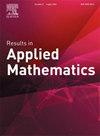求解一阶偏微分方程的高效隐式方案
IF 1.4
Q2 MATHEMATICS, APPLIED
引用次数: 0
摘要
我们提出了用高稳定性和低成本迭代法求解一阶准线性偏微分方程(PDEs)的三种新方法。第一种是在特定条件下高效收敛的新数值版特征法。接下来的两种方法最初采用的是无条件稳定的 Crank-Nicolson 方法,该方法引出了一个非线性方程组。在其中一种方法中,我们使用首个四阶系统最优方案(埃尔马科夫超家族)来求解该系统。在另一种方法中,我们使用了一种名为 JARM 解耦的新技术,对方案进行了修改,大大降低了方案的复杂性。与传统的求解方法相比,这是一个实质性的改进。在分析一些非线性 PDEs 的解法时,我们检验了这三种方法的高数值性能。本文章由计算机程序翻译,如有差异,请以英文原文为准。
High-efficiency implicit scheme for solving first-order partial differential equations
We present three new approaches for solving first-order quasi-linear partial differential equations (PDEs) with iterative methods of high stability and low cost. The first is a new numerical version of the method of characteristics that converges efficiently, under certain conditions. The next two approaches initially apply the unconditionally stable Crank–Nicolson method, which induces a system of nonlinear equations. In one of them, we solve this system by using the first optimal schemes for systems of order four (Ermakov’s Hyperfamily). In the other approach, using a new technique called JARM decoupling, we perform a modification that significantly reduces the complexity of the scheme, which we solve with scalar versions of the aforementioned iterative methods. This is a substantial improvement over the conventional way of solving the system. The high numerical performance of the three approaches is checked when analyzing the resolution of some examples of nonlinear PDEs.
求助全文
通过发布文献求助,成功后即可免费获取论文全文。
去求助
来源期刊

Results in Applied Mathematics
Mathematics-Applied Mathematics
CiteScore
3.20
自引率
10.00%
发文量
50
审稿时长
23 days
 求助内容:
求助内容: 应助结果提醒方式:
应助结果提醒方式:


